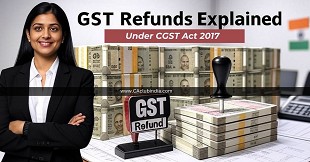GST Articles
GST Nightmares Every Indian Business Should Know in 2025
Gaurav Arya 07 June 2025 at 10:10The introduction of the Goods and Services Tax (GST) in India was celebrated as a landmark reform-ushering in the promise of "One Nation, One Tax." But for many taxpayers, professionals, and businesses, this ideal has turned into a recurring nightmare.
Rule 164 - Procedure and Conditions for Closing Proceedings under Section 128A
Member (Account Deleted) 07 June 2025 at 08:55If a person gets a notice or statement under Section 73 and is eligible for waiver of interest or penalty or both, they can apply online in FORM GST SPL-01 through the common portal.
GST Recovery Started? Stop by Paying Pre-deposit and Giving Declaration
Aarika 06 June 2025 at 12:36If you have received a GST demand, you normally have the option to appeal it. You can wish to appeal against it in the Appellate Tribunal (GSTAT)
Rectifying Human Error in GST Filings: A Judicial Perspective on a Sensitive Balance
Abhishek Raja 05 June 2025 at 08:53In this article, I examine several High Court judgments that reflect a growing judicial recognition of human error within GST compliance, particularly in return filings, Input Tax Credit (ITC) claims, and rectification requests.
The Judicial Stand Against Vague Show Cause Notices in Indian GST Law: A Comprehensive Analysis of Precedential Rulings
Abhishek Raja 04 June 2025 at 08:36The Goods and Services Tax (GST) regime in India represents one of the most significant tax reforms since independence, fundamentally restructuring the indirect tax landscape
Demand Order Raised Without Hearing? Isn't it Voidable
Niyati 03 June 2025 at 16:36The issue of a "Demand Order Without Hearing" under the CGST Act, 2017 is a legal concerns. The taxpayer must be given an opportunity to be heard before issuing any demand.
GST Refunds as per CGST Act, 2017: Procedures, Importance, Recent Updates and Practical Insights
Tanishka Vaish 03 June 2025 at 15:08As GST continues to evolve, the refund process has seen as significant procedural and technological advancements, especially with recent changes in 2025.
Navigating GST Challenges: Unsigned Orders, Refunds and Strategic Dispute Resolution
Ajay 03 June 2025 at 08:40The Goods and Services Tax (GST) regime in India, governed by the Central Goods and Services Tax (CGST) Act, 2017, provides mechanisms for compliance and dispute resolution, including relief under Section 128A, introduced via the Finance Act (No. 2), 2024.
Concept of Tax Neutrality Doctrine
AMIT RAGHAV 02 June 2025 at 08:44The Doctrine of Tax Neutrality is a foundational principle in tax policy that emphasizes that taxation should not distort economic choices or resource allocation.
The HSN reporting changes in Table-12 of GSTR-1
Ram Avtar Singh 30 May 2025 at 08:49Manual entry of HSN codes is no longer permitted. Taxpayers must select the appropriate HSN code from a predefined dropdown list.
Popular Articles
- Breaking: ICAI CA Pass Percentage Hits Historic Low in May 2025 Results
- Section 143(2) Income Tax Notice for AY 2024-25: Scrutiny Assessment, Faceless Process & Deadlines Explained
- "Why Me, God?" - A Conversation Between a CA Student and the Divine
- CA Day 2025: Fascinating Facts Every Chartered Accountant and Aspiring CA Should Know!
- Landmark Summer Judgements that cools up the GST Law
- Statutory Registers and Records Required Under the Companies Act, 2013
- The Hidden Price of Filing Your Own ITR: Mistakes That Can Cost You Big
- Statutory Tax Compliance Tracker - July 2025

Trending Online Classes
-
Certification Course on GSTR-3B Reconciliation with GSTR-2B through AI Tools
 CA Deepak Gupta15 July 2025
CA Deepak Gupta15 July 2025












 CAclubindia
CAclubindia

